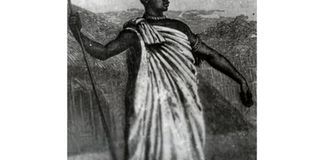Mutesa I: The Kabaka who opened the door to Europeans

What you need to know:
He was calculative, brutal too, but when Mutesa invited the white men to Buganda, he didn’t know he had given away his kingdom and Uganda’s independence.
Monitor Reporter
Kampala
Among the ancient monarchs whose actions and inactions shaped contemporary Ugandan history, few hold a position as central as that of Kabaka Mutesa I of Buganda.
Quiet, with large deep-set eyes, and described as having Hima blood, Mutesa had come to the throne in 1856 succeeding his father Kabaka Ssuuna.
According to Robert Ashe, one of the early missionaries to Buganda, Ssuuna had been a “cruel, cold-blooded and ferocious tyrant” who was so feared and hated by his people that after his death from smallpox during a raid outside the kingdom, “those who were deputed to bear the corpse of the deceased Kabaka back to the capital for burial, dashed it down to the ground with scornful fury, as if to wreak an impotent vengeance upon the dead”.
Mutesa would, himself go on to acquire the name Mukaabya (the one who causes tears) on account of his own cruelty but he was far more refined than his father.
It was under Ssuuna that Arab trade caravans from the coast had first arrived in Buganda, bringing cloth, guns and other curios in exchange for ivory but these were followed, under Mutesa’s reign, by European explorers.
The explorers were not interested in trade. They were interested, first in knowledge of what lay in the African interior and, later, in owning it outright.
It fell upon Mutesa to try and walk the delicate high-wire balancing act of trying to use the guns and brains of these foreigners to defend himself from imperialistic designs of the Egyptians in the north and the territorial ambitions of perennial rival Bunyoro.
Mutesa was a reformist king. He removed the restrictions on wearing cotton clothing that his father had imposed on his subjects, sparking a brisk trade in ivory and slaves to the supply of these and other foreign provisions.
Before his time, Buganda had no meaningful standing army other than the royal guards; the Kabaka raised armies either to defend the kingdom from external attack or to go out on a raid for slaves, territory or exact revenge and punishment.
Mutesa maintained large numbers of active soldiers who were always on duty and under the command of chiefs who received estates of land from which to support the men they led. Each Mutongole or soldier chief was required to supply men to guard the palace and to help police the kingdom for several weeks at a time.
Mutesa was a shrewd operator. Ashe, the missionary, recounts in his book a story of an Arab trader who had some beads that caught the Kabaka’s eye. He wanted more and asked the Arab how the beads were obtained. The trader, seeking to profit from Mutesa’s ignorance, said they grew from a particular seed. The trader then agreed to show Mutesa’s men how to grow the beads in exchange for a large payment in ivory.
“The beads were duly sown under the Arab’s supervision, who then thought his duties at an end, and asked for his pay and for permission to leave the country with his ivory,” Ashe wrote.
“The king, however, gravely informed the man that he had appointed him to be superintendent of the field of beads, and that he required him to watch the crop until it was ready for harvest, when he would have to instruct the reapers and also superintend the threshing.”
The Arab, who had, of course, been lying, was kept prisoner for many years, eventually being allowed to return to the coast penniless as a lesson to other would-be conmen venturing into Buganda.
Mutesa’s biggest gamble, however, was managing the interests of the Arabs alongside the white man. When the first European missionaries, Lt. Shergold-Smith and the Rev. C.T. Wilson arrived in Buganda, one of the Arab traders, Hamadi bin Ibrahim advised Mutesa to kill them. “Wherever these English put their foot, the land becomes theirs in time,” bin Ibrahim said.
But Mutesa, in reply to continuous warnings, said: “Let the Bazungu alone. If they mean to eat the country, surely they will not begin at the interior.” “When I see them begin to eat the coast, then I shall believe your words to be true.”
The Arabs, of course, were acting in their self-interest and trying to keep out competition and the abolitionist tendencies of the Europeans but history would prove bin Ibrahim right.
No grip
Within 20 years of his letter asking for friendship from the white man and inviting Christian missionaries to his kingdom, Buganda would lose its independence.
In his time, Mutesa had been able to juggle one faction against the other and, when that failed, to cause tears, but his successor Mwanga dropped the ball.
Would Buganda and Uganda have remained independent if Mutesa had killed the missionaries and other foreigners? Would Buganda and Bunyoro have been able to bury their differences and fight off the imperialists? Would they have succeeded as a joint force? Would Uganda have been better off without being colonised?
While hindsight affords us the luxury to offer academic insights to those questions, by 1890, six tumultuous years after Mutesa’s death, the imperialists had carved out their spoils and were headed for Buganda in the form of Capt. Fredrick Lugard.
WHO WAS MUTESA I?
Mutesa I Mukaabya Walugembe Kayiira was 30th Kabaka of the Buganda, ruling from 1856 until his death of suspected hepatitis in 1884, at 47.
Mutesa is reported to have had 85 wives and 96 children, including his successor, Kabaka Mwanga.
The first European explorers and missionaries came to Buganda under Mutesa but their superior military equipment and inexperience by his successors meant that they would not leave for another 70 years.




